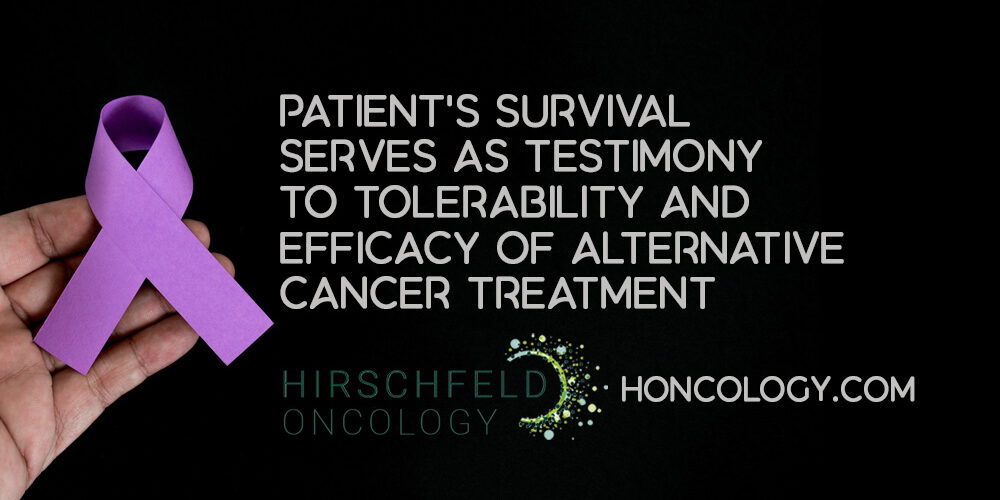Shaping the Future of Oncology with Patient-Centric Models
Overview of Patient-Centered Oncology Care
Patient-centered oncology care focuses on engaging patients and their families to develop tailored cancer treatment plans that address medical, psychosocial, and personal preferences. This approach respects individual patient values and needs, improving communication and shared decision-making. Tools such as educational resources, decision aids, and electronic health records enhance understanding and involvement, while comprehensive navigation programs support patients through complex cancer journeys.
Importance of Innovation in Cancer Treatment Delivery
Innovations in oncology care models incorporate advanced technology like AI-driven clinical insights, remote symptom monitoring, and data-driven risk stratification. These innovations enable personalized treatment paths, reduce administrative burdens, and facilitate timely interventions. Value-based payment models reinforce high-quality care delivery by incentivizing outcomes rather than volume, while digital tools improve operational efficiency and patient engagement.
Commitment to Holistic, Compassionate Care
A holistic approach integrates physical, mental, social, and economic aspects of patient well-being. Multidisciplinary teams—including oncologists, mental health professionals, dieticians, and social workers—collaborate to address the full spectrum of patient needs. Compassionate care models also provide financial and nutritional support along with mental and spiritual resources to alleviate treatment burdens. Strengthening patient-provider relationships fosters trust and empowerment, enhancing the overall cancer care experience.
New Paradigms in Oncology Care: Integrating AI and Data-Driven Insights
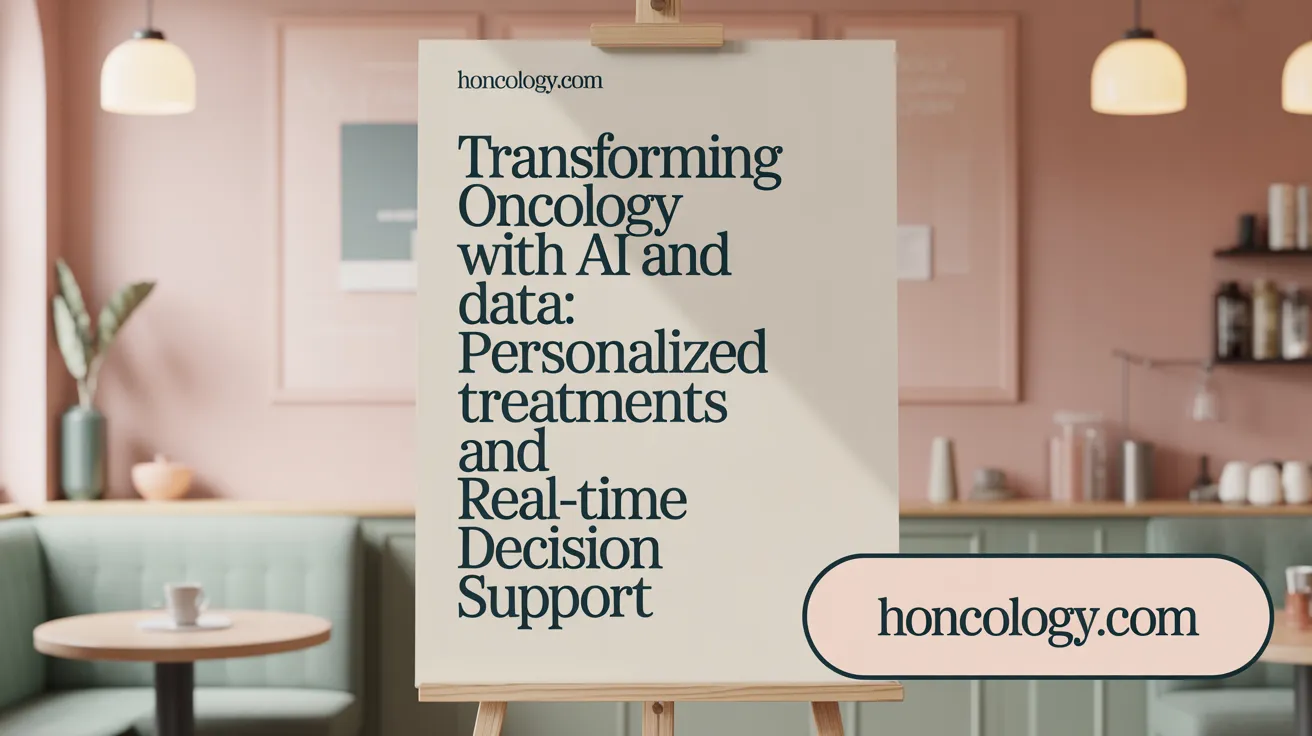
How are emerging technologies enhancing personalized cancer treatment?
Emerging AI-driven platforms like MiBA are transforming oncology care by integrating advanced technology with clinical expertise. MiBA utilizes real-time patient data from electronic health records to generate evidence-based oncology insights, uncovering patterns that optimize personalized cancer treatment plans. This innovative approach supports clinical decision-making by identifying optimal drug regimens in cancer treatment and treatment pathways tailored to each patient’s unique profile.
This AI assistance not only personalizes care but also reduces administrative burden in cancer care. By eliminating the need for prior authorizations for providers who follow high-quality treatment pathways, clinicians can focus on timely, patient-centered care rather than paperwork. The result is an enhanced oncology experience with faster treatment initiation and improved patient experience in oncology and outcomes.
What role does data play in transforming oncology care?
Data plays a pivotal role in reshaping cancer care delivery. Advanced analytics platforms harness diverse health information, including clinical records and patient-reported outcomes, to drive quality-focused cancer treatment interventions. This enables providers to tailor treatment approaches precisely based on individual patient risk factors and needs.
By continuously analyzing data trends, oncology teams can implement predictive models that forecast treatment responses and complications. These insights promote ongoing quality improvement across care settings, encouraging evidence-based, value-driven oncology practices that prioritize patient welfare and cost-effectiveness.
Streamlining care while enhancing personalization
The integration of AI and comprehensive data management also streamlines administrative processes. Innovative cancer care payment models reward adherence to high-quality care standards, encouraging efficient resource use. At the same time, personalized patient navigation programs—supported by digital platforms—help patients manage their cancer journey with confidence and coordinated support.
These technological advances collectively foster a cancer care paradigm that is both technologically sophisticated and deeply human-centered.
Innovative Payment Models Fueling High-Quality, Patient-Centered Cancer Care
How do new payment models improve oncology care delivery?
Emerging payment models like the Enhancing Oncology Model (EOM) and the earlier Oncology Care Model (OCM) have transformed oncology care by incentivizing high-quality, coordinated treatment. These programs link provider reimbursement to performance on care quality and patient outcomes rather than the volume of services. This shift encourages comprehensive care coordination, including patient navigation, 24/7 clinician accessibility, detailed care planning, and alignment with evidence-based oncology insights and guidelines.
Under these models, providers are accountable for the total cost and quality of care during defined treatment episodes, promoting proactive management of patients' needs. Enhanced care coordination, data-driven outcome improvements, and patient engagement contribute to better clinical results, higher patient satisfaction, and cost reductions.
What innovations have reduced reliance on prior authorization?
The partnership between Evolent Health and American Oncology Network collaboration introduced a novel approach to eliminate traditional prior authorization requirements. By "gold-carding" providers who adhere consistently to high-quality treatment pathways, the model removes the need for most prior authorizations for tests and treatments. This innovation significantly lowers administrative burdens and accelerates the initiation of therapy, leading to a smoother and more patient-friendly oncology care experience.
Support for underserved populations and health equity
Both EOM and Evolent and American Oncology Network partnership emphasize equity by providing additional support for lower-income and dually eligible Medicare-Medicaid patients. These frameworks integrate social needs screening and personalized care navigation to help overcome barriers related to socioeconomic disparities.
| Payment Model | Key Features | Impact on Care |
|---|---|---|
| Evolent-AON Partnership | AI-driven MiBA platform insights, gold-carding, comprehensive cancer care navigation | Eliminates prior authorization, reduces delays |
| Oncology Care Model (OCM) | Episode-based payments, 24/7 clinician access, care plans | Improved coordination, reduced costs |
| Enhancing Oncology Model (EOM) | Builds on OCM, includes social needs screening, equity focus | Supports underserved patients, enhances outcomes |
These innovative payment models are crucial in fueling a more effective, patient-centered oncology care system with less administrative friction and equitable access to high-quality treatment.
Holistic and Multidisciplinary Approaches in Patient-Centered Oncology Care
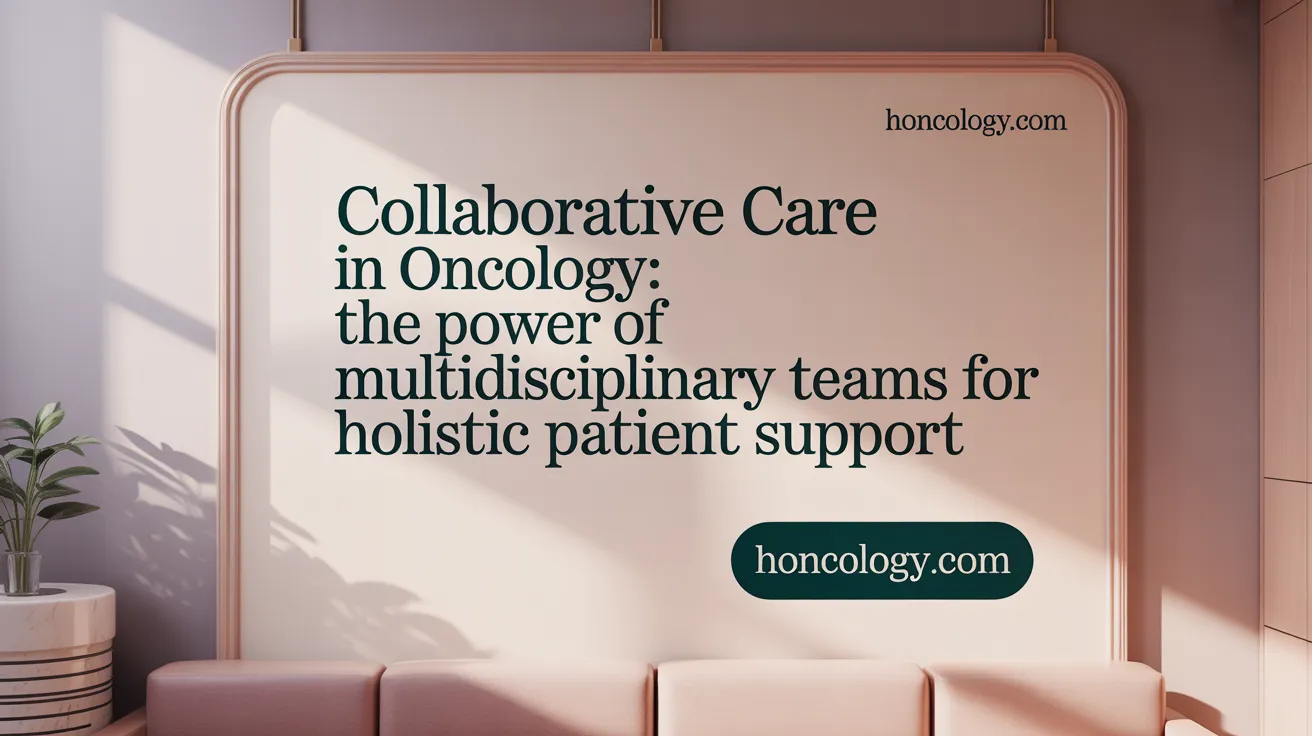
Why is a multidisciplinary team essential in oncology care?
Cancer treatment is inherently complex, involving a variety of therapies and interventions over time. This complexity necessitates a multidisciplinary cancer care teams approach where oncologists, nurses, social workers, and integrative specialists work collaboratively. Such teams coordinate timing and sequencing of treatments, while also addressing comprehensive patient needs — physical, mental, social, and economic. This approach allows patients to receive holistic care, improving both clinical outcomes and quality of life. For more information, see the 4R Oncology model and team-based oncology care.
How do models like 4R enhance team functioning?
The 4R Oncology model is an example of innovative team-based cancer care designed to improve coordination among multiple specialties. It establishes dedicated teams recognized internally and externally, composed of around two dozen specialties. These teams optimize care by addressing timing and sequencing across domains such as surgery, systemic therapy, imaging, and supportive care.
Most improvements achieved through the 4R model require relatively low effort but lead to substantial gains in process efficiency. Additionally, the model fosters ongoing reflection that supports continuous adaptation and improvement. By reducing fragmentation and emphasizing patient-centered sequences of care, the 4R model helps multidisciplinary teams deliver seamless, high-quality oncology care. Learn more about the 4R Oncology model and Cancer Care Delivery Innovations including multidisciplinary engagement.
Addressing broad patient needs through team-based care
Beyond clinical treatment, multidisciplinary teams incorporate various specialists like social workers and integrative medicine providers to address psychosocial support in cancer care, nutrition, financial guidance, and mental health. This inclusivity is fundamental to patient-centered communication in oncology care models and helps tackle barriers to treatment adherence and emotional wellbeing, fostering trust and empowerment. This approach is emphasized in patient-centered oncology care, whole-person care models, and oncology care navigation.
Together, these team-based approaches represent a vital evolution in cancer care — treating patients as whole persons and enabling coordinated, comprehensive treatment journeys. For broader context on cancer care innovation and patient-centered approaches, see innovative cancer care models and multidisciplinary cancer care teams.
Patient Engagement and Communication: Foundations of Effective Oncology Care
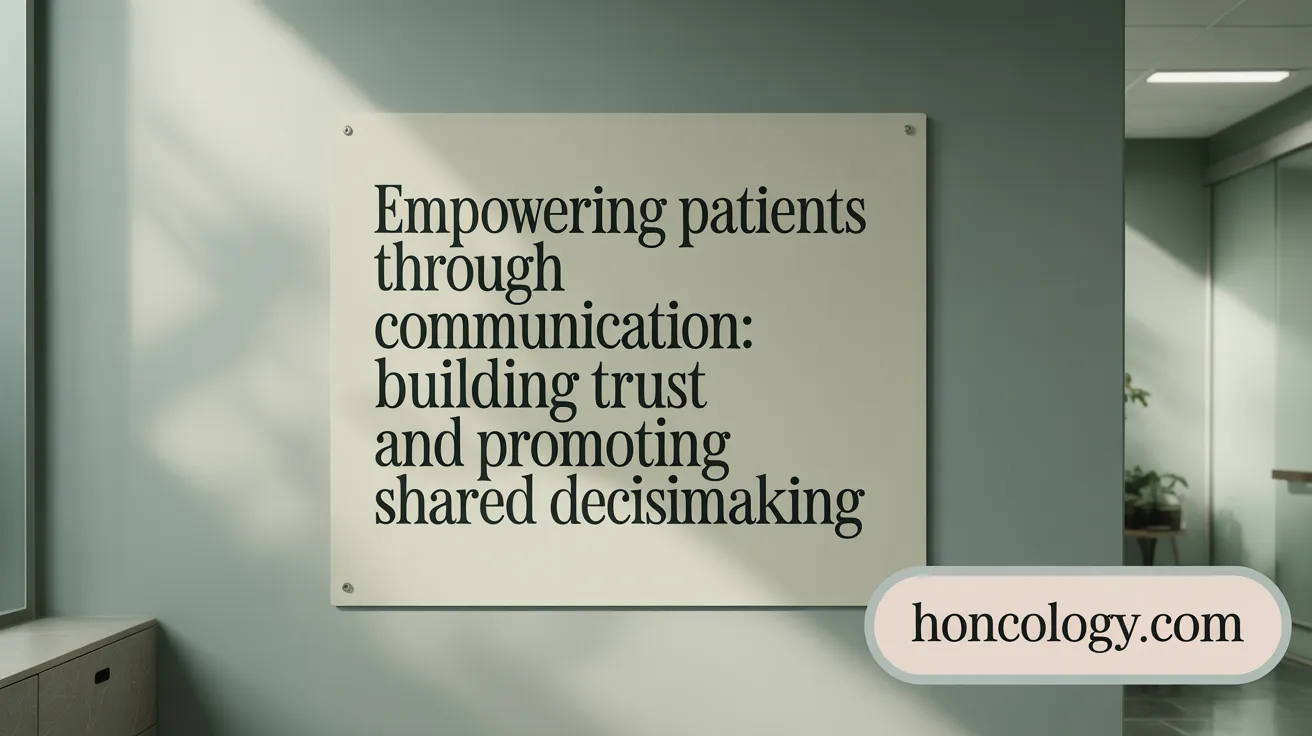
How can patient-centered communication improve cancer care outcomes?
Patient-centered communication plays a crucial role in enhancing cancer care outcomes. It fosters trust between patients and healthcare providers, enabling patients to feel more confident and involved in their treatment decisions. By respecting individual preferences and values, care plans are better tailored to meet patient goals, which can improve adherence to treatments and overall satisfaction. For more on Patient-centered cancer treatment planning and shared decision making in oncology, see this resource.
Tools such as decision aids, educational resources, and electronic health records integrated with AI-driven insights help clarify prognosis and treatment options. This transparency encourages shared decision-making, allowing patients to actively participate in their care journey and better understand potential side effects and long-term effects of treatments. Explore Transforming oncology care with AI technology for more on AI integration in oncology.
Use of decision aids and educational resources
Decision aids including informational packets, videos, and symptom screening tools help patients grasp complex medical information. Electronic health records now often contain embedded decision support systems that provide real-time patient-specific explanations to support evidence-based treatments. For comprehensive insights, refer to Patient-Centered Care Planning and Use of Decision Aids.
Educational materials accessible online and personalized navigation services simplify the cancer care process, empowering patients and their families to make informed choices. Patient navigators also facilitate communication by bridging gaps between clinicians and patients. See Comprehensive cancer care navigation for innovative navigation approaches.
Addressing emotional, cultural, and social determinants of health
Effective oncology care recognizes emotional and cultural sensitivities. Support services like mental health counseling, social work, nutrition guidance, and language-specific materials address psychosocial concerns. Comprehensive care models incorporate these supports to reduce anxiety and improve patient confidence. For more, read about Innovative care models in psychiatry and supportive oncology care and Addressing psychosocial health and social needs in cancer care.
Barriers such as low health literacy and cultural differences can be mitigated through provider training in culturally competent communication, integration of patient navigators familiar with community needs, and offering educational content in multiple languages. These strategies help overcome disparities and enhance equitable care. See Health equity in oncology treatment models for additional details.
What barriers exist and how can they be overcome?
Barriers include limited time during consultations, variability in patient communication preferences, and healthcare system fragmentation. To overcome these, multidisciplinary cancer care teams and health informatics are essential, supported by training initiatives focusing on empathy and communication skills. Incorporating technology-based tools that streamline information sharing and support patient engagement reduces administrative burdens and fosters better patient-provider interactions.
Overall, patient-centered communication that respects individual needs and cultural contexts forms the foundation for improved cancer care outcomes and experience. For comprehensive approaches to patient-centered oncology care models and quality improvement as well as innovations in cancer care delivery, these references provide additional guidance.
Technological Innovations Supporting Patient-Centric Oncology Care Delivery
What digital innovations are advancing oncology care?
Oncology care is rapidly evolving with the integration of advanced digital technologies. AI-powered decision support tools now embed directly into electronic health record (EHR) systems, providing clinicians with real-time patient insights and evidence-based oncology insights. This enhances clinical decision-making, especially in community cancer centers where resources may be limited.
Remote monitoring tools using Bluetooth-enabled devices and digital symptom trackers allow continuous outside-clinic data collection, improving patient outcome tracking and timely intervention. Telehealth platforms expand access to care, enabling patients to connect with providers conveniently.
These digital innovations not only streamline workflows and augment personalized care but also support sustainability of oncology programs by optimizing resource use and patient engagement.
What are best practices for incorporating AI safely?
Safe AI implementation in oncology hinges on maintaining a balance between technological support and human clinical expertise. To ensure accuracy and trust, clinicians should be trained in AI-independent diagnostic methods and regularly verify AI-generated outputs manually. This practice helps prevent errors stemming from overreliance on automated systems.
Human-centered strategies include designing AI tools to assist—not replace—care providers, fostering clinician familiarity with AI mechanics, and integrating AI workflows smoothly into existing clinical processes. These steps help preserve care quality while harnessing AI’s potential. More on best practices for safe AI integration can be found here.
Challenges and strategies for safe AI implementation
Challenges include potential errors from AI, the risk of diminished clinician skills without manual oversight, and the need for adequate provider training. Strategies to address these involve ongoing education, incorporating feedback mechanisms, and ensuring transparency in AI decision-making processes. This approach fosters safe adoption and enhances confidence among both providers and patients.
These technological advances, when thoughtfully applied, significantly enhance patient-centric oncology care delivery by enabling personalized, efficient, and coordinated treatment pathways.
Addressing Psychosocial and Social Needs to Enhance Patient Experience
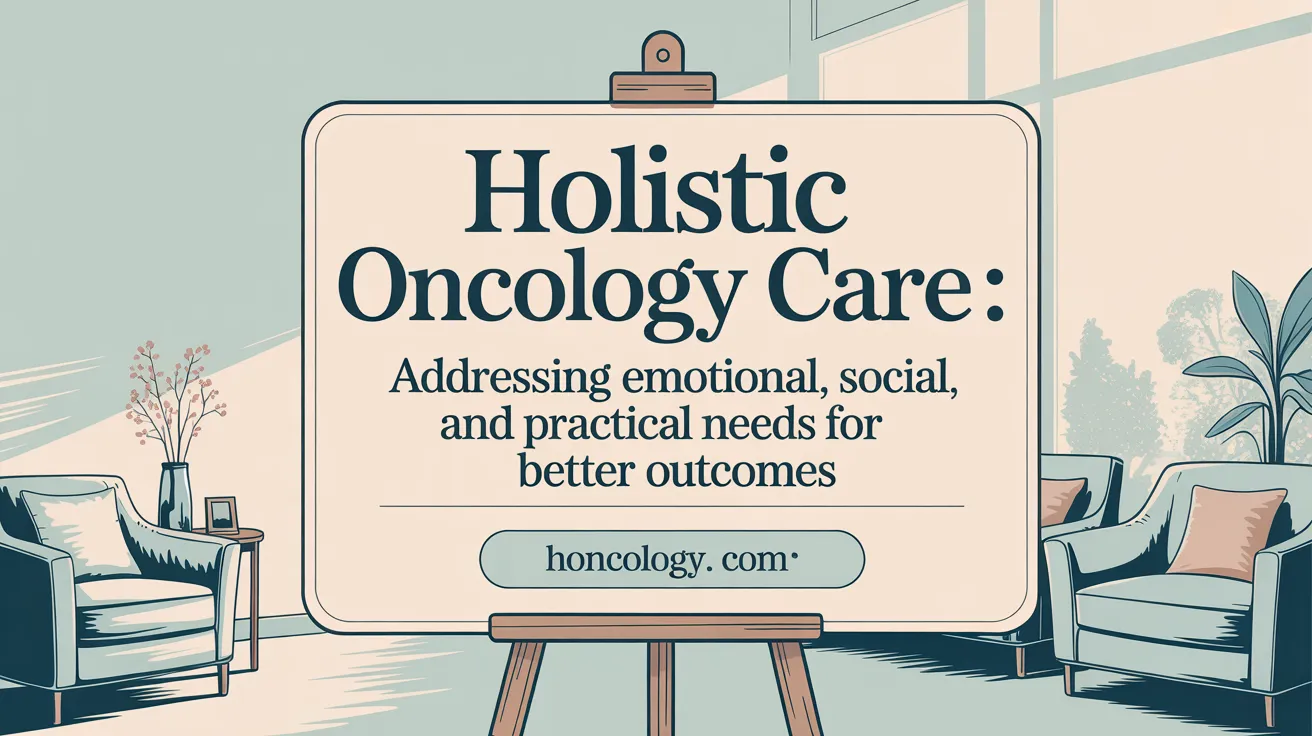
How do psychosocial support and social need screening impact oncology care?
Psychosocial support in cancer care involves integrating mental health support for cancer patients, nutritional counseling, and personalized patient navigation. These services help address the emotional distress and practical challenges patients face during cancer treatment. Screening for social determinants of health allows care teams to identify individual patient needs such as financial difficulties, transportation barriers, or housing instability. By recognizing these factors early, healthcare providers can tailor interventions, improving treatment adherence and accelerating timely care (Cancer care delivery innovations).
What successful models incorporate these elements?
Several innovative care models emphasize psychosocial and social needs to improve patient outcomes and experiences. The Enhancing Oncology Model (EOM) includes comprehensive care coordination with patient navigation, screening for social needs, and 24/7 clinician access, supporting patients throughout their cancer journey. Patient navigation programs have proven effective in reducing hospitalizations, emergency visits, and healthcare costs, especially near end-of-life, while increasing hospice use (Innovative oncology care models). These approaches build patient confidence, foster trust, and ensure more personalized and continuous support (Patient-Centric Care).
Comprehensive care navigation and support services
Programs incorporating personalized cancer treatment plans provide patients with dedicated guidance managing appointments, treatment decisions, and psychosocial challenges. In-house services like mental health support and nutritional counseling aid patients in coping with treatment side effects and emotional strain (Innovative care models in psychiatry).
Mental health integration in oncology
Mental health care is increasingly recognized as vital in oncology. Oncology clinics are expanding multidisciplinary cancer care teams to include psychiatric and psychosocial professionals (Innovative care models in psychiatry. Screening tools are used early to identify distress, allowing prompt intervention and improved overall wellbeing (Psychosocial care in cancer treatment).
Screening for social determinants and tailored interventions
Routine evaluation of social determinants helps detect barriers such as insurance status, language proficiency, and socioeconomic factors. Addressing these with targeted resources enables smoother treatment pathways and equity in care delivery, benefiting outcomes across diverse populations (EOM social needs screening, Cancer care delivery innovations.
Future Directions: Learning Health Systems and Holistic Oncology Care Models
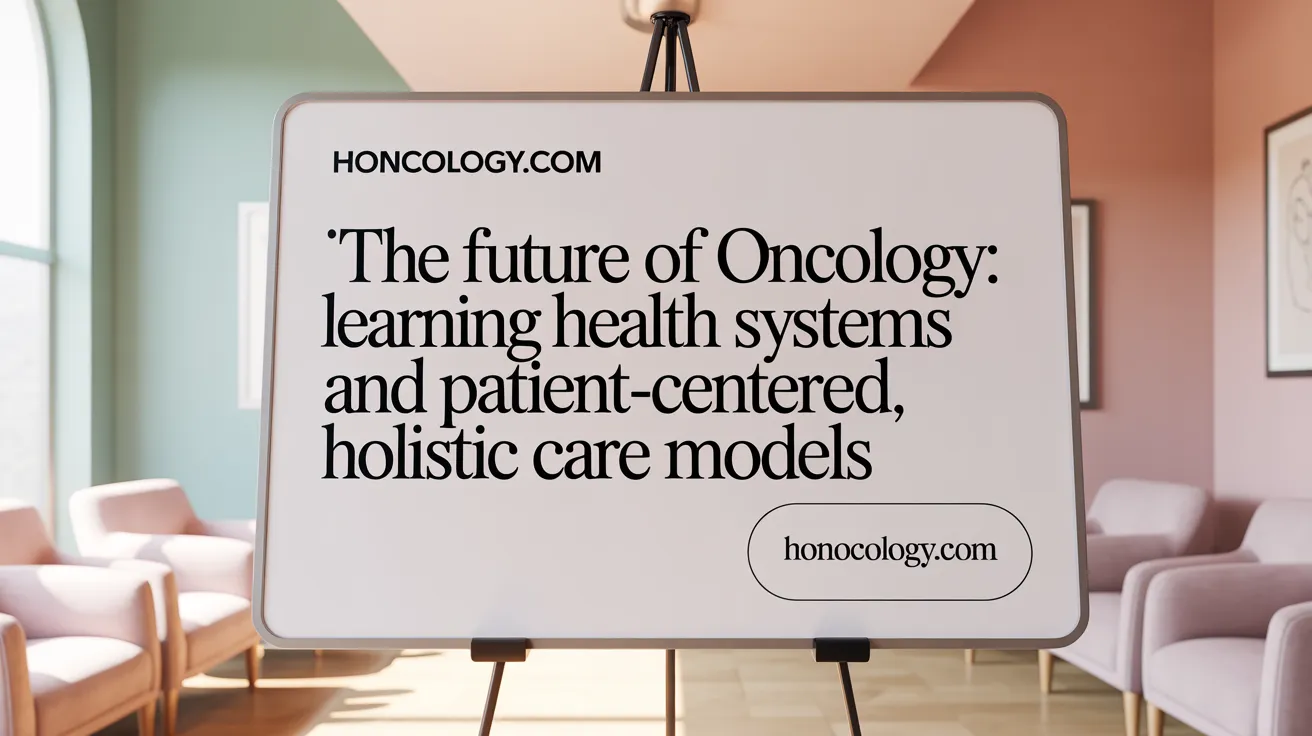
What characterizes the next generation of oncology care?
The future of oncology care is marked by a holistic approach that treats patients as whole persons. This model integrates medical, psychological, social, and economic factors to support individualized treatment plans and overall well-being. Learning health systems play a critical role by continuously analyzing real-time data from diverse settings to refine therapies and improve outcomes. These systems enable rapid adaptation to new evidence, fostering personalized care pathways that respond to each patient’s unique journey.
How is Hirschfeld Oncology advancing these models?
Hirschfeld Oncology is advancing oncology care by embracing the principles seen in the Oncology Care Model overview and the Enhancing Oncology Model (EOM). They focus on building multidisciplinary cancer care teams that place patients at the center. This approach combines proven, evidence-based oncology insights with innovative complementary therapies addressing mental, social, and financial needs. Hirschfeld Oncology also champions data-driven quality improvement and patient advocacy, aiming to create a care experience that restores hope and enhances quality of life.
Expanding high-functioning teams and ongoing quality improvement
Successful care relies on high-functioning, coordinated teams that cover all aspects of patient needs—oncologists, mental health experts, nutritionists, social workers, and others. Models like the 4R Oncology model show how multidisciplinary team-based cancer care can achieve better timing and sequencing of treatment steps across domains including surgery, systemic therapy, genetics, imaging, and supportive care. Continuous quality improvement is embedded in these models, with teams reflecting on processes to enhance efficiency and patient outcomes, supported by cutting-edge data analysis tools and AI-driven clinical insights.
Together, these innovations herald a transformative era in cancer care that is more compassionate, precise, and effective, ensuring patients receive comprehensive support through every phase of their treatment journey.
Empowering Patients Through Innovation and Compassionate Care
Innovations Transforming Oncology Care
Cancer care is rapidly evolving through groundbreaking innovations that greatly enhance patient outcomes and experience. New models, such as the partnership between Evolent Health and the American Oncology Network, utilize AI-driven platforms like MiBA to deliver evidence-based, personalized treatment plans without relying on burdensome prior authorizations. Additionally, programs like the Enhancing Oncology Model incentivize value-based, patient-centered care, offering continuous clinician support, navigation services, and comprehensive care coordination. Emerging technologies in digital health—including remote symptom monitoring and machine learning—are enabling precise, real-time decision-making and nurturing greater care efficiency.
Commitment to Personalized, High-Quality Care
Central to these advances is the focus on individualized, compassionate care that respects each patient's preferences and needs. Efforts incorporate multidisciplinary teams comprising oncologists, psychologists, nutritionists, and social workers to holistically support patients physically, emotionally, and socially. Patient navigation programs, thorough care planning with shared decision making, and addressing social determinants of health foster trust and empowerment throughout the cancer journey. Furthermore, value-based payment models align financial incentives to promote quality outcomes while reducing unnecessary interventions.
Sustaining Progress and the Path Ahead
To sustain and expand these benefits, ongoing innovation in healthcare delivery models, robust data integration, and continuous quality improvement are essential. Training clinicians in patient-centered communication and integrating advanced informatics will strengthen personalized care strategies. Embracing technology without compromising the vital human connection ensures that AI and digital tools act as aids rather than replacements. Supporting policy reforms that incentivize equitable access and care coordination will help translate these advancements into widespread, lasting improvements in cancer treatment and patient wellbeing.





.png)


.png)
.png)


